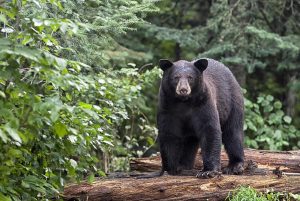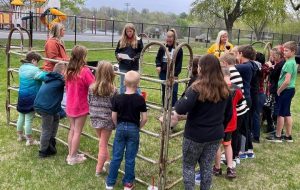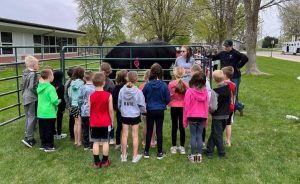CLICK HERE for the latest market quotes from the Iowa Agribusiness Network!
CLICK HERE for the latest market quotes from the Brownfield Ag News Network!
CLICK HERE for the latest market quotes from the Iowa Agribusiness Network!
CLICK HERE for the latest market quotes from the Brownfield Ag News Network!
(Iowa DNR News/Des Moines, Iowa) ⎯ Several state parks and forests will be hosting family-friendly programming and activities as part of Iowa Department of Natural Resources (DNR) new Summer Kick-Off event, June 9-11. “Summer Kick-Off is our way of showing appreciation for our visitors with activities the entire family can enjoy,” said Sherry Arntzen, chief of Parks, Forests and Preserves Bureau for the Iowa DNR. Planned events include hikes, nature programs, fireside chats, kayaking clinics and more. A list of parks and their programs, activity sheets and ideas for ways to explore parks is available online at www.iowadnr.gov/kickoffsummer.
Those wanting to camp during the Summer Kick-Off celebration are encouraged to make their reservation soon. Iowa has more than 4,400 state park campsites with most reservable in advance. Reservations can be made through the reservation system. “Iowa state parks are beloved overnight destinations for many people,” said Arntzen. “We offer campsites that appeal to a broad range of campers, from the more rustic hike-in sites to those with all the modern amenities.” ![]()
For visitors who prefer cabins over tents, the Iowa DNR has more than 90 cabins available to rent across 20 state parks and forests, Arntzen said. In the off season from Labor Day to Memorial Day, cabins can be rented for a two-night minimum stay. During the peak of summer, most cabins require a seven-night minimum visit. As of now, all state parks have water turned on, with shower and restroom buildings open for campers. A few parks do have renovations and closures, so check the park closure page at: www.iowadnr.gov/parkclosures when planning your visit. Visit the DNR’s website to sign up for electronic news updates and information about campsites, cabins, events and more.
(Iowa DNR News) – There’s a pretty good chance that, in the next several weeks, Northeast Iowa will be visited by a few wandering black bears coming down from Minnesota and Wisconsin ahead of the breeding season. It’s been an annual occurrence in this region each spring since 2014. While much of Iowa does not have the habitat necessary to support a black bear population, certain locations do, primarily northeast, eastern and southern parts of the state. As black bear populations in Wisconsin, Minnesota and Missouri are stable to increasing, it is possible that a small population could set up residence in Iowa.
“Within the next three to five years, we may see cubs show up and a small breeding population become established. If that occurs, we should look to our neighbors in Wisconsin and Minnesota who have learned to live with bears,” said Vince Evelsizer, furbearer and wetland wildlife research biologist with the Iowa Department of Natural Resources (DNR). “It won’t be perfect and there will be bumps along the way, but we need to start having conversations about the idea of bears coming back to Iowa, at least in certain places along the Mississippi River and Northeast Iowa where suitable habitat exists.”
Wisconsin’s black bear population is estimated to be 23,300, Minnesota’s 12,000 – 15,000 and Missouri, which held its first bear hunt last fall, as many as 1,000. Missouri’s population is growing at an estimated 9 percent annually. “For example, in Wisconsin, with that many black bears, residents have learned to make a few adjustments to minimize bear conflicts, like putting away their bird seed in the spring, putting away their barbeque drip pans, and by keeping pet food and garbage in places bears can’t access. There are still occasional problems, but these basic precautions result in much fewer negative encounters between bears and humans,” Evelsizer said. 
Bears are omnivores and their diet changes with the seasons. In the spring, bears emerge from their winter dens hungry. They’ll feed heavily on newly emerging tender grasses and sedges. In summer, its berries, ants, various plants, and grubs. In the fall, its acorns and other tree nuts. They are also known to feed on nontraditional sources, like row crops, orchard fruits, and honey – which is similar to striped skunks and raccoons. “They’re like a big raccoon, motivated by hunger and willing to take advantage of whatever food is available, from fawns to eggs, bee hives, bird feeders – this is where making some changes can minimize nuisance bear interactions,” he said.
Black bears are native to Iowa. However, Iowa has been without a resident bear population for more than 100 years. In the Iowa code, black bears are not listed as a species of wildlife found in Iowa because they were not present in the state when these laws were created, nor have they been since. This means the Iowa DNR does not have the legal authority to manage black bear populations through actions such as designating protection status or adding a limited hunting season if the population eventually support it in the future. Iowa is the only state among its Midwest neighbors where the state’s wildlife agency does not have regulatory authority to manage bear populations, which typically includes handling nuisance conflicts and conducting research.
While the Iowa DNR does not regulate bears, it does have a bear response protocol. “The objective with the response protocol is to provide guidance for our staff in dealing with any potential human-bear conflicts that arise. A proactive strategy will increase the odds for a better outcome for both the bears and for humans. For example, trap and transport of bears is a common scenario shown on TV shows, however in reality most states have moved away from this method because it often results in simply moving the problem to someone else’s backyard. It’s all about reducing conflicts where bears are instead,” Evelsizer said. “We want to keep Iowans informed about this interesting and emerging wildlife story and increase our collective knowledge about bears in order to live with them successfully and minimize conflicts.”
Since 2002, there have been 49 confirmed black bears in Iowa, and two to five per year since 2014. As bears have become more of a regular visitor, the chance to encounter a bear, although small, is a possibility. “Black bears have some general tendencies and habits, but individual bears may go against the norm. Some are shy, others are not. They are typically secretive and want to be left alone – while others are bold and may be more daylight active,” he said. Bears are typically nocturnal but get more active during late May to July breeding season, especially at dawn and dusk. Most of Iowa’s bear sightings start in late May continuing into early July.
“If you encounter a bear, avoid running away,” Evelsizer said. “Instead, back away slowly and cautiously while facing it. Make noise so they know you’re there.” There are a number of resources available to help people minimize conflict with bears, Evelsizer said, including www.bearwise.org.
(Des Moines, Iowa) — Iowa Secretary of Agriculture Mike Naig, this week, announced that the Iowa Department of Agriculture and Land Stewardship has received an additional $2.9 million for utilization in the Iowa Local Food Purchasing Assistance Program (ILFPA). The statewide program launched in June of 2022 to facilitate the purchase and distribution of Iowa grown and produced food for use by underserved communities.
The program, which also received an extension through May of 2025, is funded through the United States Department of Agriculture (USDA) via the Commodity Credit Corporation Charter Act. Iowa originally received approximately $2.7 million, and the extension adds an additional $2.9 million, bringing the total to over $5.6 million in program funding. The Iowa Department of Agriculture and Land Stewardship has an operating agreement with Iowa Valley Resource Conservation and Development (Iowa Valley RC&D), which will continue to lead project management and ensure successful program implementation.
“Given the rising consumer interest in local foods, I love that we can build connections between Iowa farmers and Iowa consumers while also strengthening supply chains,” said Secretary Naig. “The Iowa Local Food Purchasing Assistance Program establishes the foundation for longer term partnerships that will create new markets for farmers, increase access to nutritious food and help our community members who are food insecure.”
During the first phase of the program, $684,456 in food value was paid to farmers and producers in the state, including nearly $393,193 to socially disadvantaged farmers.
ILFPA is expected to benefit at least 300 Iowa farmers. With a reach of 2,000 food distribution sites through partnerships with 16 distributors, including food hubs, food banks, and the Meskwaki Nation, the decentralized emphasis allows local specialists to meet the community’s needs through the implementation plans they design for their area.
To learn more about the program or how to participate, visit www.iowalfpa.org or https://iowaagriculture.gov/
(Radio Iowa) – The U.S. Supreme Court has rejected two major farm groups’ challenge of a California law requiring breeding pigs have more space in livestock confinements.
The American Farm Bureau and the Iowa-based National Pork Producers Council argued it will cost the swine industry up to $360 million to abide by the California requirement and reconfigure the pens for sows. The groups also contend the 2018 California ballot initiative opens the door to having other states pass regulations that affect farm operations outside their borders.
Trish Cook, a pig farmer from Winthrop who’s president of the Iowa Pork Producers Association, said some small and medium-sized producers will go out of business and consumers will pay higher prices for pork because of the Supreme Court’s decision. “To say it’s disappointing is a large understatement,” Cook said.
Cook suggests upholding Proposition 12 — the voter approved California animal welfare standards — may lead to an escalation of farming regulations. “The ruling sets a really bad precedent because it does enable states to regulate commerce outside their boundaries,” Cook said. 
U.S. Supreme Court Justice Neil Gorsuch wrote that companies must normally comply with the laws in states where their products are sold. Iowa Senator Joni Ernst, in a tweet, said the court is letting extremists in California effectively ban bacon that comes from Iowa hogs. Iowa Senator Chuck Grassley also tweeted after the ruling was issued, saying you can expect to pay more for bacon, since California’s the largest consumer market and pork producers nationwide will have to respond to these regulations.
In a written statement, Iowa Ag Secretary Mike Naig said the court’s decision will allow large states to start dictating how other industries and businesses in the rest of America operate.
(Radio Iowa) – A farmer from California who works with war-torn countries to restore crops to the land is the 2023 World Food Prize Laureate. World Food Prize Foundation President, Terry Branstad made the announcement this (Thursday) morning at the National Academy of Sciences in Washington, D-C. “I am so pleased to announce that the 2023 World Food Prize Laureate is Heidi Kuhn,” Branstad says. It was Branstad’s first laureate announcement since he took the World Food Prize Foundation position. He is a former Iowa governor and Ambassador to China. Branstad says Kuhn is the founder and C-E-O of the nonprofit “Roots of Peace”organization.
“Our 53rd laureate has built a model of work directly with farmers to restore farmland and food security after a devastating conflict. Through this work, she has shown more than a million people living in war torn regions, a way forward to restoring peace and prosperity through agriculture,” he says. Branstad says Kuhn developed a process that has proved to be successful around the world. “First, she partners with the mining organizations to clear landmines,” he says, “then she works with farmers to replant fields with modern agriculture practices, our laureate has worked in nine countries to confront the daunting challenge of rebuilding food systems and livelihoods after conflict.” He says her efforts started by partnering with wineries in her home state of California to raise funds to remove landmines in Croatia so they could replant vineyards and orchards.
“Then she took this model to Afghanistan. After clearing landmines. There, she helped farmers including more than five-thousand women produce high-quality crops,” Branstad says. “She built agriculture value chains and provided market support and development. Her organization is one of the few us nonprofits that still operate in Afghanistan.” Kuhn was not at the announcement as Branstad says she is working in Azerbaijan to remove landmines, which is her Mother’s Day tradition.
The World Food Prize was created by Cresco, Iowa native Norman Borlaug. Borlaug won the Nobel Prize for his efforts to end famine. Kuhn will receive the World Food Prize at a ceremony on October 26th at the Iowa State Capitol in Des Moines.
(Atlantic, Iowa) – On Friday, May 5th, the Atlantic FFA Chapter held a farm safety/petting zoo day at Washington Elementary. According to Atlantic FFA Reporter Lily Johnson, the event gave students at Washington Elementary the opportunity to experience being around large farm animals. They also got to learn about dangerous farm equipment and learn how to be safe when operating it and they heard about FFA and beef products, from the Cass County beef queen and princess.
Farm Safety Day was led by the Atlantic FFA Chapter officer team, the Atlantic High School Animal Sciences class, and some FFA members. Atlantic FFA Advisor Eric Miller said “I thought it was a fun day and everyone had a chance to learn something new.” The Animal Science class picked 13 areas of need that were involved in bringing animals and equipment to help teach kids about safety around equipment. Those stations gave the Atlantic Elementary students an opportunity to learn more about the animals and equipment they might find on a farm. 
The petting zoo included a cow, a draft horse, sheep, a goat, poultry, a pig, and rabbits. The equipment there included a tractor, a rotary rake to show how a PTO works, a gravity wagon, a lawn mower, and a side-by-side UTV. Maddy Anderson said “I thought the kids had a lot of fun and learned about different types of animals and types of large equipment used on farms, I also think the kids got a lot of hands on experiences.”
The Cass County Beef Queen and Princess, Claire Pellett and Callee Pellet, taught the kids about cattle and beef by-products, along with FFA knowledge, with the assistance of Callee Pellett. She said “I think that it went really well and i love seeing all these little kids get excited about all the animals and have so many questions about agriculture.”
(Article and photo submitted by Eric Miller)
(Atlantic, Iowa) – Rolling Hills Bank and Trust has partnered with the Atlantic Parks and Rec Department, to purchase fruit trees for our area parks as a community orchard. During an Ambassadors meeting Parks Director Wyatt Adderton spoke about the tree loss in our parks, and how they were going to need to replace some trees.
Assistant Parks Director Jeff Christensen later commented about a beloved pear tree located near the pool that they lost recently. He said it was a shame that it died so many people loved that tree. 
Rolling Hills Loan Manager B.J. Hart said “I went back to the bank wanting to do something and talked with CEO Keith Honke about a tree project. Keith encouraged me to get some information which prompted me to contact our new director. As Wyatt and I were talking the idea was born to have a community orchard.”
The Parks and Recreation Department purchased 26 fruit trees. Apple, Pear and Cherry Trees. The first tree for the Community Orchard was planted today (Wednesday), at Sunnyside Park.
(Radio Iowa) – Farmers had dry planting weather most of last week before storms hit — and they made the most of it.The corn harvest shot to 70 percent planted compared to 29 percent in the previous week. Corn planting had been one day behind the five-year average, and is now one week ahead. The U-S-D-A also reports that six percent of the planted corn has emerged — one day ahead of average. Soybean planting moved to 49 percent complete — up from 16 percent the week before — and one week ahead of the five-year average.